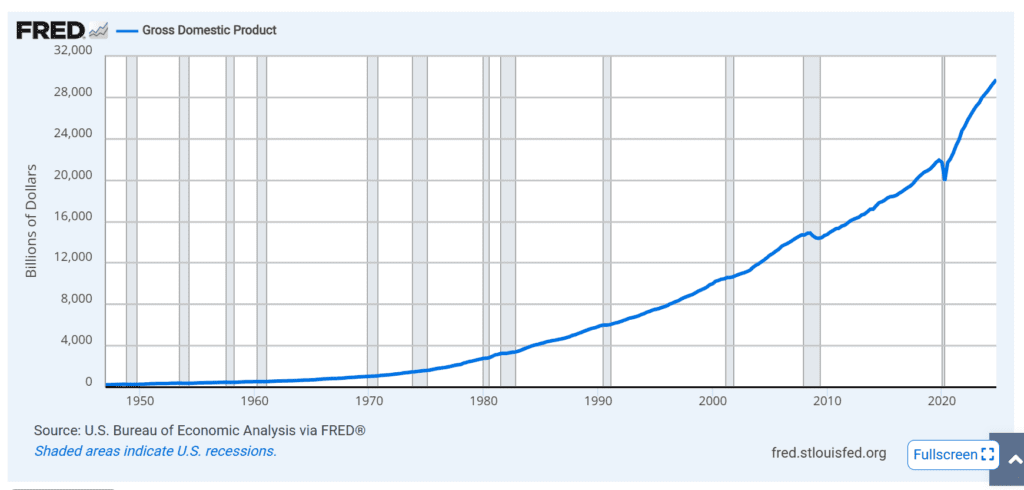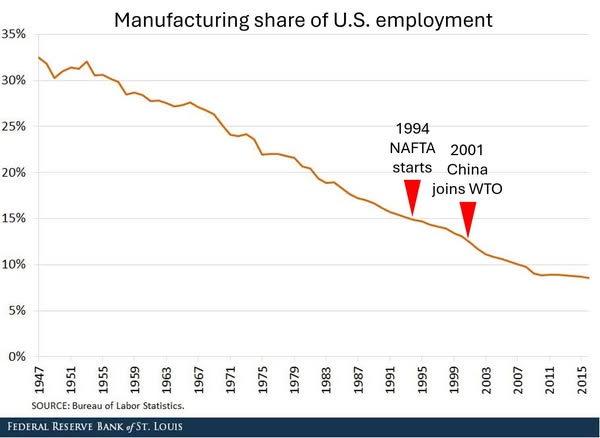
Last Wednesday when President Donald Trump announced his plans to impose tariffs, he justified the action by saying America had been “looted, pillaged, raped and plundered” by our trading partners for the last 50 years.
The entire tariff regime that has roiled stock and bond markets — and has business leaders scrambling for new supply chains — is premised on the idea that we are being taken advantage of and losing.
There are, undoubtedly, bad actors and unfair practices on the global stage. China most of all. But the data suggests America actually got rich over the last 50 years, markedly raising the standard of living, in no small part because of trade.
Our nation boasts not only the largest economy in the world, but the largest in human history. Measured against ourselves, the U.S. economy was $1.6 trillion in 1974. Today, it is roughly $30 trillion.

This translates to considerably higher wages for U.S. citizens. American workers’ per capita incomes now measure over $82,000, dwarfing all but a handful of much smaller countries. Mississippi, the poorest state in the union, now bests the income levels of Great Britain, France, Spain and Italy, among many others.
A Few Proof Points on Our Progress Over Time
Income: People earn more dollars today, adjusted for inflation. The median household income in 1950 was less than half of the current median. Even people in the lowest quintile of income have experienced real wage growth. And it’s important to recognize that the number of children per family has nearly been cut in half. This means not only do people have more money, but fewer “mouths to feed.”
Longevity: People live longer today. The average person lived 68 years in 1950. By 2019, we’d gained 11 years of life. Infant mortality has been cut in half in the last fifty years. While our healthcare system is expensive, developments in the field have dramatically prolonged and improved lives.

Home & Cars: People live more opulently today. The average home in 1950 was under 1,000 square feet. Today, the average home is almost 2,500 square feet. It’s loaded with much posher finishes and technology. When it comes to the garage, the number of 2 vehicle households have doubled and some of them now drive themselves. While home prices are problematic (more of a supply problem in an increasingly urbanized society), they would be even more unaffordable without trade.
Work-Life Balance: People have more free time today. The average worker works 8 hours less every week now compared to the 1960s. He or she engages in 7 hours a week more leisure activity. This additional leisure time is the equivalent of 7 weeks of vacation time a year. Leisure budgets have more than tripled since the 1960s, even when adjusted for inflation.
Better Stuff, Cheaper: Most of the products we rely on are cheaper on a relative basis to income today. Consumer goods have become much cheaper, with better technology and more reliability. As an example, the average annual rate of deflation on a television between 1950 and today was 6.53%. Computers used to take up entire rooms. Today, we have a more powerful one in our pockets that doubles as a phone.
In short, we have more money, more time, live longer, travel and engage in leisure more freely, have bigger houses, better cars and more stuff.
Trade Helped Build That
In economics, there is a concept called “comparative advantage.” Think of it as you doing the thing you are uniquely suited to do. Once, American homesteaders built their own houses, grew their own crops, sewed their own clothes, and so on.
Trade made it so that a person could specialize in one thing, earn a living, and then use the money earned to buy the things they could not produce themselves. Wealth exploded in a mutually beneficial way.
That happens on a global stage, as well. There are things that workers in other countries can produce that we cannot, or that they produce at a much lower price than we possibly can. No matter how hard we try, Americans are not going to grow bananas at scale.
When we import things from overseas we cannot make here, it increases the options available to American consumers. When Americans buy products cheaper than we can afford to make them, that means Americans can spend their time and resources on higher pursuits. Both of these things increase, not decrease the standard of living — allowing us to have more for less.
Gutting Manufacturing?
One of the prevalent arguments in favor of tariffs is that previous trade agreements like NAFTA gutted American manufacturing. NAFTA was replaced in 2020 by the USMCA, a trade agreement negotiated by the first Trump administration between the U.S., Canada and Mexico.
But 50 years before NAFTA took effect, manufacturing employment in the U.S. began declining — largely driven by new technologies that increased efficiencies and required fewer employees.

In that same period, even with fewer employees, U.S. manufacturers dramatically increased productivity. Today, American manufacturers’ output is near record levels. Trade did not kill U.S. manufacturing. Technology transformed it.
Notably, there are also 600,000 existing vacant jobs in the manufacturing sector according to the National Association of Manufacturers.










